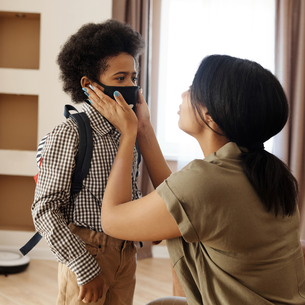 For the first time since December 20, fewer than 10,000 Texans are hospitalized with COVID-19 according to the Texas Tribune. However, the current number of 9,401 Texans hospitalized, and the emergence in Texas of new, highly contagious strains signals the grim reality that it will long time before things will return to normal. As the COVID crisis lingers, it's effect on people's lives, especially those trying to manage children between two homes, grows increasingly burdensome. For those who have family law disputes, the challenges are increasing as the COVID crisis lingers into its second year. Here are the top three problems that our firm has experienced with our clients: 1. Job Loss Affecting Child Support Payments One of the most obvious and direct impacts to daily life due to the COVID crisis is how it has hurt family income. As more small businesses flounder and shut down, job losses in Texas are climbing steadily. Separated and divorced parents are often already struggling to make ends meet, but as the COVID crisis endures, they will see savings dry up and soon existing child support payments may slow or stop. Courts in the Houston and Galveston areas remain sensitive to parents in this situation but are proceeding with child support enforcement case as normal. They are issuing contempt orders as readily as before, and it is incumbent on the parent ordered to pay support to approach the Court early about having their child support obligation reduced if they are experiencing financial difficulty due to COVID related job loss or reduction in hours. Failure by the payer to seek to have the previous order modified- even if temporarily - may result in contempt actions being brought by either the obligee or the Texas Attorney General. And despite the understanding the Courts may grant the obligor in these extraordinary times, it should be noted that the Courts have not abandoned the expectation that parents must supply evidence of their particular financial challenges or economic hardships. It's recommended that parents seek legal counsel to assist them. Many lawyers, such as our firm, offer affordable limited scope services to help in this situation. 2. Changes in Living Conditions For many Texas families, the day to day physical living conditions and circumstances have been negatively impacted by the lingering COVID crisis. In a recent divorce case, the father sought the immediate sale of the marital home where the mother and the two children were still living. The father, an optometrist, claimed that the COVID crisis had reduced his income by half, and as the sole wage earner, he could no longer afford to pay the mortgage and costs for the couple's large home. The mother counter-argued that the father chose to keep his practice closed longer than necessary and that COVID restrictions had been lifted. The Court reviewed the larger financial situation of the couple and ordered the immediate sale of the home and temporary support payments for the mother for her to rent a smaller house. The Court declared that "COVID-19 has at least temporarily ruined the financial prospects of both of these parties. And neither of them is to blame." 3. In-person vs. Online Learning Many if not most Texas schools offer two options for children to attend school- traditional attendance at the school ("brick and mortar") or virtual learning using software and the internet ("online"). However, when parents do not agree on what is best for the children- as often happens during and after divorces- then disputes arise that often wind up in court. In a different recent divorce case, a temporary order directed the mother would be the temporary primary caregiver of the children and the father would have weekend visitations through the divorce proceedings. It also directed that the children should be taught virtually. The mother, although not working herself and being supported financially by the husband, was not satisfied with the temporary order because she wanted the kids in school. After the temporary hearing, the mother shut off her internet service- which she calculated she could do because it was not specifically prohibited by the Court. Without internet access the kids could not attend school virtually. The father was soon alerted to the situation and took the mother back to court. At the emergency hearing the mother pressed to explain her actions and their impact on the children's education. The mother "mostly deflec[ed]" and stated the children's educational needs were being met otherwise. The Court ultimately ordered the mother to immediately provide internet and all necessary equipment for the children to attend school virtually. The Court also admonished the mother that if she again attempted to thwart the order, then primary care would be given to the father. In Summary The COVID crisis has been with us for over a year and it seems we have a long way to go before things return to normal. The long length of this crisis is having trickle-down effects on separated and divorced families in many ways. These result is an increase in conflicts where often the only resolution is to seek relief from the courts with the help of an experienced family law attorney. If you have experienced any of these issues, or you if you think there are other issues that are more widely experienced that the ones we have listed, we invite your comments below. Two days after Hurricane Hanna touched down in Texas, there are thousands who remain without power. For the Houston and Galveston areas, we go lucky with only intermittent rain. But the storm it is a firm reminder that we are just beginning the 2020 hurricane season. With the disaster of Hurricane Harvey and other devastating hurricanes not yet in the distant past, many of our neighbors are reassessing their emergency plans and stocking up on supplies- even if it means doing so in facemasks. In addition to taking these steps, parents who share custody of their children may also want to reassess their parenting plans and visitation arrangements to ensure that they reflect potential natural disasters.
If you already have a natural disaster provision in your own parenting plan, this may be a good time to reevaluate it and ensure that it is still in your family’s best interest. If, on the other hand this type of clause is not included in your parenting plan, you should consider speaking with an experienced League City child custody attorney who can help you decide whether amending your parenting plan is an appropriate course of action in your case. Emergency Parenting Plan Provisions Natural disasters are devastating and many ways, including relationships with our children. For instance, a hurricane or tropical storm, could make it impossible to safely transport a child to his or her other parent. In other cases, an emergency could make it necessary to evacuate with a child to avoid emergency weather conditions. Parenting plans can include provisions that specifically address these types of situations and detail what co-parents should do when a disaster strikes. For example, some parents choose to include a provision stating that in emergency situations, the parent who is with the child can fail to comply with the standard parenting time schedule and instead, take whatever actions would be in the child’s best interest, including evacuation or sheltering in place. In addition to these types of provisions, many parents also choose to include specific steps that the parties must take during emergencies to keep in contact with the child’s other parent. Even when these directions are not included in a parenting plan, however, it’s still a good idea to communicate regularly with a child’s other parent to discuss what action should be taken in the event that communication is interrupted. Contact an Experienced Child Custody Attorney in League City Keeping one’s children safe should be a parents primary concern at all times, but especially during a natural disaster. Parents who can do this while also informing the child’s other parent of their plans is highly advisable in these cases. However, what’s this has been achieved and the disasters no longer looming, parents should strongly consider obtaining legal advice about any deficiencies in their parenting plans when it comes to disaster planning.  A big decision needs to be made early on in a divorce case- who will take care of the kids? Separated or newly divorced parents have to make tough decisions about child care in the best of times, but with the spread of the coronavirus, those choices are harder than ever. As our Texas Governor moves forward with re-opening the economy, more parents are returning to work. This has made child care decisions more urgent -and desperate-for millions of Texans. Child care options are decreasing Most single parents with minor children need to work during the day. In the pre-pandemic days, one common option for many was to have grandparents watch the children while the primary care parent works. However, not every parent is blessed with this as an option. And now, with the spread of the Covid-19 virus and it's high death rate among the elderly, many people who did have this option are now not willing to risk the lives of their own parents by exposing them to grandchildren who often do not display symptoms of Covid-19 and can infect their unwitting grandparents with the virus. The usual option, if relatives are not available, is to rely on private daycare. But many parents are worried that they will be putting their children at risk by taking them to a daycare center during a pandemic. This fear is spurred by news that Texas has just experienced one of it's most infectious and deadly weeks for Covid-19. State data shows an increase in coronavirus cases stemming from both large gatherings and child care centers. The state reported 576 positive cases of the coronavirus — 382 staff members and 194 children — in child care facilities as of this week. That’s up from 59 cases in mid-May. Are Daycare Facilities Safe? Little Guidance from the Government. Of those facilities that remain open, even at limited capacity, the State's response to the fears of contaminating kids in daycare has been muddled, to say the least. Just two weeks ago, the government surrendered all existing regulation of safety measures at state-licensed child care centers. As of mid-June they were no longer required to comply with a list of safety precautions that had been in effect since mid-April. That meant centers could decide for themselves if they wanted to check staff temperatures, require parents to drop off their children outside or stop serving family-style meals, according to a previous notice from the state Health and Human Services Commission. Then, in an apparent reversal this week, Gov. Greg Abbott directed a state health agency to enact new safety standards for child care centers during the coronavirus. However those new standards have not yet been published. To make matters less clear, individual county and municipal authorities in Texas have been sending mixed messages to citizens about how their local government plans to respond to the recent deadly spike in infections. In Harris County, which includes the City of Houston, Judge Lina Hidalgo has announced plans to mandate masks and return to the stay-at-home conditions imposed this Spring. Meanwhile in neighboring Galveston County, which includes more suburban and semi-rural /industrial areas, Judge Mark Henry has defiantly announced that he won't issue any new government restrictions and said people must rely on their own personal responsibility to stay free from infection. Ultimately, Parents Must Find Daycare Options and Judge Facility Safety On Their Own Experts say that daycare is a key piece to reopening the U.S. economy. If a single parent must go back to work and has no other child care options, then choosing among the remaining daycare facilities that remain open in the area may be the only choice. But without clear government guidance, selecting the safest daycare facility for your child is a daunting challenge. That is why we are offering a checklist of the most important, researched questions to ask a daycare facility before you enroll your child. The checklist is based on expert recommendations and can help you determine if a child care, daycare or daycamp facility is coronavirus ready. No facility can guarantee your child will be 100% safe from infection, but download this free checklist and bring it with you when you visit the facility or ask questions from it when on the phone. Researched from the CDC and other experts, this question checklist will help you pick the safest daycare facility. The Palmer Law Firm is offering this checklist as a free public service. To download the Daycare Safety Checklist. Please click HERE.
 Since 1973, the number of father only families has increased at a faster rate than has the number of mother-only families. Today, 15% of all single-parent families are headed by a father. Fathers facing divorce should consider carefully any decision they make about child custody that is based on old, outmoded ideas of "traditional" roles. And although they are changing somewhat slower than the rest of society, the courts are coming around to the realization that fathers can make just as successful single parents as mothers. So it is time to reexamine some of the old myths about single fathers. Myth #1: Fathers who gain custody were themselves products of single-parent families. There is no evidence to suggest that fathers who are awarded custody of their children were raised in any specific way. Studies in the 1980s show that 80% of fathers who are awarded custody grew up in a two-parent households, but this was likely to be the result of a generational difference because divorces were far less common in the 1950s and 1960s than they are today. Today's single father can come from any kind of background and upbringing. Myth #2: Custodial fathers have high incomes It is well documented that there is an extremely high percentage of mother-only families that are below the poverty level. What is less well know is that more than 18 percent of father-only families are poor. Another 21 percent are just above the poverty line. If there is a custody dispute, the ability to afford a child is indeed one of the factors the court will decide in determining who gets custody. Higher income will give one party and advantage- if combined with other factors. But remember, the amount of income is only relative to the other parent. If both parents receive the same amount of income, even if it is very little, this will not sway the courts. Myth #3: Most Custodial Fathers have remarried. Although custodial fathers are more likely to be married than custodial mothers, the fact is that most custodial fathers (59%) are not currently married. Myth #4: Custodial Fathers primarily receive custody of older boys This myth really has two parts: first, the fathers primarily obtained custody of older children and second that fathers are more likely to receive custody of boys. It is true that the children living in father-only families are older than those living in mother-only families. This may be a hang-over effect of the "tender-years doctrine" which favored women over men for custody of young children. Many family courts followed the doctrine for years, but it has fallen aside with other stereotypes and is not a lawful factor in Texas courts. Still, 17.5 percent of single-father families include children younger than three, and about a third contain a preschooler. Similarly, although children in father-only families are somewhat more likely to be boys, 44 percent of all children in such families are girls. Myth #5: Most custodial fathers are widowers. This may have been true at one time, but being a widower is not were you will find most custodial fathers today. In fact, you will only find 7.5 percent of single father households being widowers today. As a matter of fact, 24.5 percent of single father households are headed by never-married fathers. Many fathers make their decisions about whether to seek custody based on outmoded ideas about what is acceptable in society and in the courts. But these myths need to be busted and fathers need to based their decisions on the real and current facts. If you are a father involved in a custody battle, you need to seek the truth from an experienced family law attorney who will help you separate fact from fiction. For more information, please visit us at www.bayshoreattorney.com |
Need more information about this or other family law topics in Texas?
Click the button below to book a FREE ATTORNEY CONSULTATION (832) 819-3529
Attorney Sean Y. Palmer has over 20 years of legal experience as a Texas Attorney and over 25 years as a Qualified Mediator in civil, family and CPS cases. Palmer practices exclusively in the area Family Law and handles Divorce, Child Custody, Child Support, Adoptions, and other Family Law Litigation cases. He represents clients throughout the greater Houston Galveston area, including: Clear Lake, NASA, Webster, Friendswood, Seabrook, League City, Galveston, Texas City, Dickinson, La Porte, La Marque, Clear Lake Shores, Bacliff, Kemah, Pasadena, Baytown, Deer Park, Harris County, and Galveston County, Texas.
Call (832) 819-3529 If you live in the Houston area and would like to consult with one of our attorneys, please leave your information below.Archives
July 2024
Categories
All
|
The Palmer Law Firmwww.thepalmerlawfirm.com
(c) 2024 Sean Y. Palmer |
DISCLAIMER:
This website is for educational and informational purposes only and is not, nor is it intended to be, legal advice. Viewing of this website does not create an attorney-client relationship. All legal matters should be discussed with a licensed attorney before you take any action. You should consult with an attorney for advice for your individual situation. Sean Y. Palmer is the attorney responsible for the content of this site. DATA NOTIFICATION: Pursuant to the Health Insurance Portability and Accountability Act, and the Texas Medical Records Privacy Act of the Texas Health and Safety Code, consumers are noticed that their protected healthcare information may be transmitted electronically. |



 RSS Feed
RSS Feed